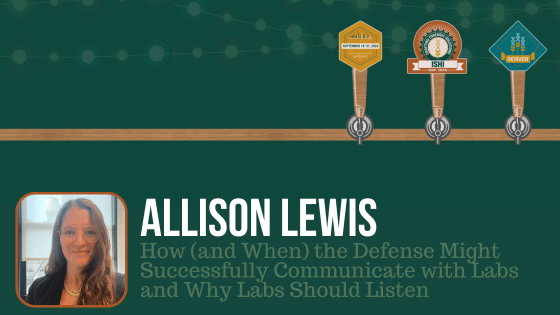There are many reasons the voice of the defense does not get considered during testing, hypothesis building, comparison and reporting of DNA evidence. It could be because testing is completed and consumed before counsel is assigned or any arrest made. It could be a defense request is made but the lab does not agree to honor it, not appreciating its value. Or it could simply be that the defense perspective is always the defense prerogative, and they choose to remain silent. The result, however, is that the information and context that accompanies DNA evidence are often exclusively provided by law enforcement.
In recent years, the forensic community has begun to recognize the importance of the defense voice in DNA testing and hypothesis building.[1] The defense may have critical information that could change the results significantly. Knowing whether individuals are biologically related may alter how a sample is interpreted. Obtaining a critical elimination sample may impact the confidence we have in an elusive minor contributor or shed light on a defense theory of the facts. Adding a comparison sample where none was previously considered could exonerate the innocent.
In her presentation at ISHI 34 this year, Allison will use four real life case work and outcomes to support the central thesis that incorporating defense input to the DNA lab’s analysis and hypothesis building, where possible and when available, leads to more accurate and just results. These examples include a dismissal of a homicide where an additional comparison was requested, the discovery of exculpatory evidence when the data was further investigated, a startling shift in a statistical result with a closer look, and finally, an unfortunate illustration of the problems that arise when labs refuse to honor the defense’s request.
What is one key learning that attendees will be able to take back to the lab and implement based on your presentation?
Hopefully the scientists will gain a new understanding and appreciation for the perspective of the defense attorney in testing decisions and requests.
Who in the audience will benefit most from your presentation? If someone was interested in learning more about your topic, do you have recommendations for resources?
The person in the audience who would benefit the most would be a laboratory analyst (or anyone really) who does not understand how or why the defense acts as they do. Those who feel (as so many do – even my own mom!) that in criminal justice, the question is guilt versus innocence rather than guilty versus not guilty. I hope attendees will benefit by understanding that the role the defense plays is critical to the system and freedom. My hope is that folks will thereby be more likely to entertain requests from the defense bar for further investigation of results.
What inspired you to seek out a career in the forensic field?
Working as a public defender for many years, I saw and experienced how difficult it was for defenders to dive deep on challenging scientific principles while also working to be effective advocates with incredibly high caseloads and nonstop demands of court. As the complexity and prevalence of DNA evidence continued to increase, it became obvious that we needed attorneys to specialize and advise. I love teaching my colleagues how to understand, investigate, challenge and communicate these sophisticated scientific principles to clients, to courts, to factfinders. DNA can be a powerful ally in storytelling. For both sides.
If you could go back in time, what advice would you give to your younger self as you were starting out?
Don’t be afraid to ask the question! You’re certainly not the only one wondering. And even if you are, it’s better to ask now than to never know. Also wear sunblock…
If you had to pick one thing, what do you enjoy most about your job?
Working with my clients, supporting them and their families, and letting them know there is someone in their corner, no matter guilt or innocence, but also no matter their darkest moment or worst actions. Everyone deserves an advocate.
If you’ve attended ISHI in the past, what do you most enjoy about coming to the conference?
When I attended ISHI, I had a wonderful conversation with two lab analysts (at a happy hour), who were very surprised to meet a defense attorney in attendance at ISHI. It’s part of what motivated this abstract and talk. I want more understanding and exposure for both sides. My advice would be introduce yourself to new people. Sometimes it’s hard when you already know someone at a conference. But force yourself to be uncomfortable. You will be pleasantly surprised at what you find.
What is one item on your bucket list? Have you checked if off yet?
Jazz fest in NOLA, and I am planning to go in 2024!
What’s one thing that others may not know about you?
I love artichokes. I think there is no argument – – they are definitely the most interesting vegetable out there.
WOULD YOU LIKE TO SEE MORE ARTICLES LIKE THIS? SUBSCRIBE TO THE ISHI BLOG BELOW!
SUBSCRIBE NOW!


